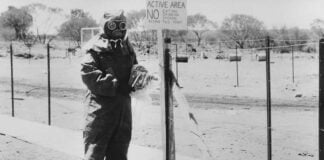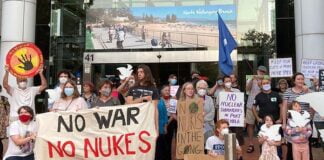Barack Obama’s much-lauded nuclear summit in April was nothing more than a show of muscle by the world’s biggest nuclear powers, in an increasingly volative global environment. Despite his talk of efforts to create a “nuclear free world”, Barack Obama showed that he has no plans to abandon US nuclear supremacy.
Much has been made of the agreement between Russia and the US to reduce their nuclear stockpiles. But Ivan Oelrich of the Federation of American Scientists noted, “the treaty contains a peculiar counting rule: each bomber counts only as one nuclear bomb, although the B-52 can carry 20 nuclear-armed cruise missiles and the Russian bombers have similar payloads. If we define a bomber with 20 bombs as a single bomb, then suddenly we get a substantial reduction in the number of nuclear weapons.”
And the US and Russian stockpiles of 5000 warheads each are still enough to destroy the planet several times over.
Threatening Iran
The Obama administration used the summit to reinforce statements made in its recent Nuclear Posture Review that it retains the right of nuclear attack on nations like Iran and North Korea not signatory to the Nuclear Non-Proliferation Treaty. This came as a thinly veiled warning to Iran, which formed the central topic of the summit.
Obama’s review further stated, somewhat hypocritically, that “the fundamental role of US nuclear weapons… is to deter nuclear attack on the United States, our allies, and partners.”
Professor of international relations at Harvard Stephen Walt argued, “If the US government believes that ‘the fundamental role’ of US nuclear weaponry is to deter nuclear attacks on the US, and the US is now proclaiming that it still reserves the option of using nuclear weapons first against non-nuclear Iran…then wouldn’t a sensible Iranian leadership conclude that it could use a nuclear arsenal of its own… to deter us from doing just that?”
A notable absence from the conference was Israeli Prime Minister Binyamin Netanyahu.
Israel’s deputy prime minister was sent to the summit after concerns that Egypt and Turkey were preparing to grill the country on its own undeclared arsenal, which is estimated at up to 400 thermonuclear weapons.
Yet there was no talk of sanctions or attacks on Israel by the world’s powers.
The Obama administration declared potential threats of nuclear terrorism a key focus of the summit. However, whilst theoretically uranium enriched to 35 or 40 per cent could be used to make nuclear weapons, it would take at least several hundred kilos.
The logistical difficulties of attaining such a vast amount of enriched uranium—which is kept under such close government surveillance that it has never appeared on the black market—mean this is hardly a weapon terrorists could use.
The nuclear summit in Washington did not signify a global step forward in dealing with nuclear proliferation.
The world’s big nuclear powers continue to pose the greatest threat to global security, most notably the US and Israel.
Rather than add to the applause that has greeted the White House’s new nuclear policies, activists should step up their efforts against the US military machine—from the wars in Afghanistan and Iraq to the Pentagon’s latest repackaging of nuclear war threats.
As Joseph Gerson and Walden Bello wrote in their book Empire and the Bomb: How the US uses nuclear weapons to dominate the world, “Whatever Barack Obama’s promises about ridding the world of nuclear weapons, the threat of nuclear war will remain a lynchpin of US military power.”
Sadly, Obama’s rhetoric has failed to prove them wrong.
By Abbie Munro





